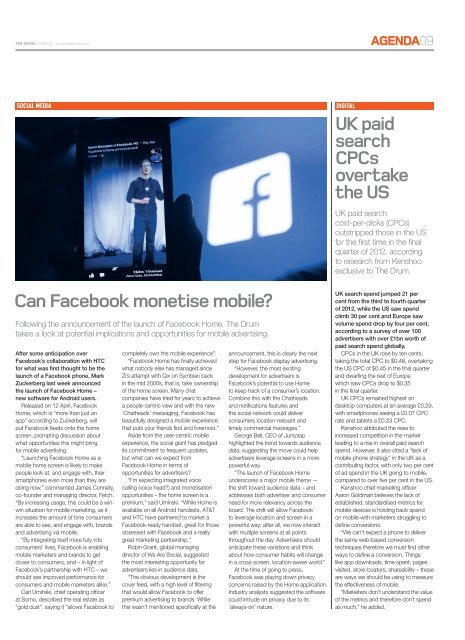REAP WHAT YOU SOW - The Drum
REAP WHAT YOU SOW - The Drum
REAP WHAT YOU SOW - The Drum
Create successful ePaper yourself
Turn your PDF publications into a flip-book with our unique Google optimized e-Paper software.
THE DRUM 12.APR.13 www.thedrum.com AGENDA09social media digitalUK paidsearchCPCsovertakethe USUK paid searchcost-per-clicks (CPCs)outstripped those in the USfor the first time in the finalquarter of 2012, accordingto research from Kenshooexclusive to <strong>The</strong> <strong>Drum</strong>.Can Facebook monetise mobile?Following the announcement of the launch of Facebook Home, <strong>The</strong> <strong>Drum</strong>takes a look at potential implications and opportunities for mobile advertising.After some anticipation overFacebook’s collaboration with HTCfor what was first thought to be thelaunch of a Facebook phone, MarkZuckerberg last week announcedthe launch of Facebook Home –new software for Android users.Released on 12 April, FacebookHome, which is “more than just anapp” according to Zuckerberg, willput Facebook feeds onto the homescreen, prompting discussion aboutwhat opportunities this might bringfor mobile advertising.“Launching Facebook Home as amobile home screen is likely to makepeople look at, and engage with, theirsmartphones even more than they aredoing now,” commented James Connelly,co-founder and managing director, Fetch.“By increasing usage, this could be a winwinsituation for mobile marketing, as itincreases the amount of time consumersare able to see, and engage with, brandsand advertising via mobile.“By integrating itself more fully intoconsumers’ lives, Facebook is enablingmobile marketers and brands to getcloser to consumers, and – in light ofFacebook’s partnership with HTC – weshould see improved performance forconsumers and mobile marketers alike.”Carl Uminski, chief operating officerat Somo, described the real estate as“gold dust”, saying it “allows Facebook tocompletely own the mobile experience”.“Facebook Home has finally achievedwhat nobody else has managed sinceZi’s attempt with Qix on Symbian backin the mid 2000s, that is; take ownershipof the home screen. Many chatcompanies have tried for years to achievea people-centric view and with the new‘Chatheads’ messaging, Facebook hasbeautifully designed a mobile experiencethat puts your friends first and foremost.”Aside from the user-centric mobileexperience, the social giant has pledgedits commitment to frequent updates,but what can we expect fromFacebook Home in terms ofopportunities for advertisers?“I’m expecting integrated voicecalling (voice head?) and monetisationopportunities – the home screen is apremium,” said Uminski. “While Home isavailable on all Android handsets, AT&Tand HTC have partnered to market aFacebook-ready handset, great for thoseobsessed with Facebook and a reallygreat marketing partnership.”Robin Grant, global managingdirector of We Are Social, suggestedthe most interesting opportunity foradvertisers lies in audience data.“<strong>The</strong> obvious development is thecover feed, with a high level of filteringthat would allow Facebook to offerpremium advertising to brands. Whilethis wasn’t mentioned specifically at theannouncement, this is clearly the nextstep for Facebook display advertising.“However, the most excitingdevelopment for advertisers isFacebook’s potential to use Hometo keep track of a consumer’s location.Combine this with the Chatheadsand notifications features andthe social network could deliverconsumers location-relevant andtimely commercial messages.”George Bell, CEO of Jumptaphighlighted the trend towards audiencedata, suggesting the move could helpadvertisers leverage screens in a morepowerful way.“<strong>The</strong> launch of Facebook Homeunderscores a major mobile theme —the shift toward audience data – andaddresses both advertiser and consumerneed for more relevancy across theboard. <strong>The</strong> shift will allow Facebookto leverage location and screen in apowerful way; after all, we now interactwith multiple screens at all pointsthroughout the day. Advertisers shouldanticipate these variations and thinkabout how consumer habits will changein a cross-screen, location-aware world.”At the time of going to press,Facebook was playing down privacyconcerns raised by the Home application.Industry analysts suggested the softwarecould intrude on privacy due to its‘always-on’ nature.UK search spend jumped 21 percent from the third to fourth quarterof 2012, while the US saw spendclimb 30 per cent and Europe sawvolume spend drop by four per cent,according to a survey of over 100advertisers with over £1bn worth ofpaid search spend globally.CPCs in the UK rose by ten cents,taking the total CPC to $0.48, overtakingthe US CPC of $0.45 in the final quarterand dwarfing the rest of Europewhich saw CPCs drop to $0.35in the final quarter.UK CPCs remained highest ondesktop computers at an average £0.29,with smartphones seeing a £0.07 CPCrate and tablets a £0.23 CPC.Kenshoo attributed the rises toincreased competition in the marketleading to a rise in overall paid searchspend. However, it also cited a “lack ofmobile phone strategy” in the UK as acontributing factor, with only two per centof ad spend in the UK going to mobile,compared to over five per cent in the US.Kenshoo chief marketing officerAaron Goldman believes the lack ofestablished, standardised metrics formobile devices is holding back spendon mobile with marketers struggling todefine conversions.“We can’t expect a phone to deliverthe same web-based conversiontechniques therefore we must find otherways to define a conversion. Thingslike app downloads, time spent, pagesvisited, store locators, shareability – theseare ways we should be using to measurethe effectiveness of mobile.“Marketers don’t understand the valueof the metrics and therefore don’t spendas much,” he added.









